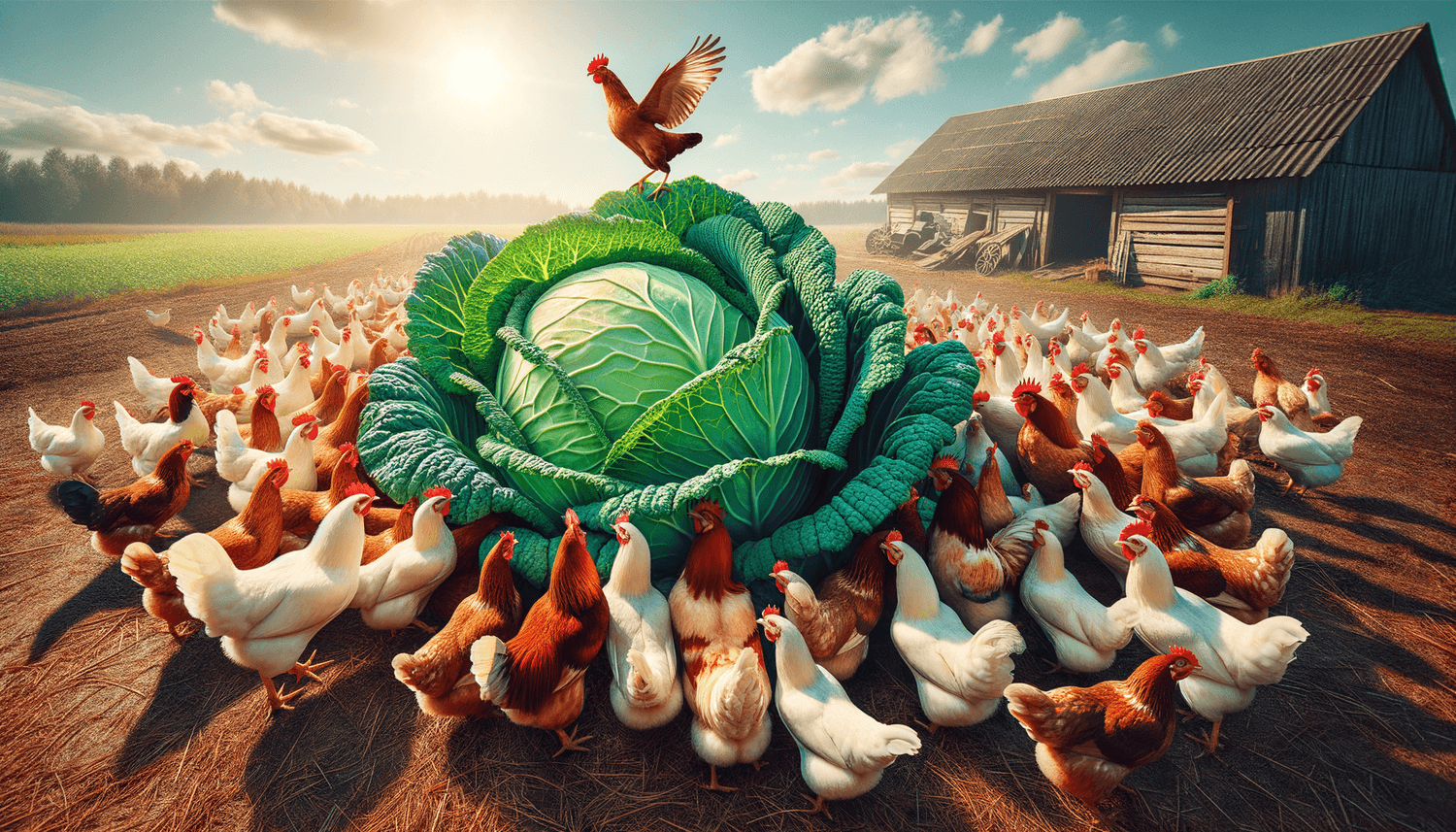Are you wondering if chickens can ‘cabbage’ the night away in your bountiful garden? Well, don’t keep your hens waiting any longer, today we are going to flock straight to the point on this leafy query! In this blog post, we’ll peck at whether or not chickens can actually eat cabbage, delve into the importance of maintaining a balanced diet for your feathered friends, uncover the potential benefits and/or risks, discuss the nutritional value, and of course, guide you on how to prepare this green feast for your clucky companions. Prepare to flap over the path to a groovy garden banquet for your backyard brood!
Can chickens eat cabbage?
Yes, chickens can absolutely eat cabbage, and it is safe for them to enjoy! Cabbage is packed with essential nutrients and vitamins that can benefit your chickens’ health. Just remember to balance their diet with other grains, protein sources, and vegetables to ensure they receive all the necessary nutrients for their overall well-being.
Finding balance in a chicken’s diet
Just like us humans, our feathered friends need a well-balanced diet to stay happy and healthy. A balanced diet not only provides essential nutrients, but also helps maintain their overall well-being, immune system, and laying capabilities. Proper nutrition for your flock starts with a high-quality chicken feed, which plays a crucial role in their daily sustenance.
Chicken feed should make up around 80-90% of a chicken’s diet. This is because it has been specifically formulated to provide them with the right balance of protein, vitamins, and minerals to keep them at their best. Nonetheless, the remaining 10-20% of their diet can consist of tasty treats – this is where fruits and vegetables, like cabbage, come in. These treats can give them additional nutrients, add variety to their diet, and enrich their environment by providing them with new and exciting textures and tastes.
Nutritional value of cabbage for chickens.
Feeding cabbage to chickens offers an array of nutritional benefits that contribute to their overall health. Cabbages are a rich source of vitamins such as vitamin C, vitamin K, and several B vitamins, including thiamine (B1), riboflavin (B2), niacin (B3), pantothenic acid (B5), pyridoxine (B6), and folate (B9). These vitamins play vital roles in various aspects of your chicken’s health, from supporting a robust immune system to promoting healthy feathers and facilitating energy production.
Beyond vitamins, cabbage also contains essential minerals like calcium, iron, magnesium, phosphorus, potassium, and zinc. Calcium supports strong bones as well as proper eggshell formation, while other minerals contribute to a range of biological functions, including electrolyte balance and metabolic processes. In addition to vitamins and minerals, cabbage possesses high water content, which helps with hydration and contributes to regulating body temperature.
Last but not least, cabbage is packed with dietary fiber, which is beneficial for your chickens’ digestive health. The fiber assists with digestion by bulking up their feed, helping to maintain a healthy gut and ensure smooth passage through the digestive system. Overall, adding cabbage to your chicken’s diet provides them with valuable nutrients, hydration, and support for their overall health, making it a great treat now and then.
Nutrition table of cabbage for chickens.
| Information | Description |
|---|---|
| Nutritional Value | Rich in vitamins C, K, and various B vitamins; essential minerals like calcium, iron, magnesium, phosphorus, potassium, and zinc. |
| Suggested Serving Size | Small, manageable portions shredded or chopped; make up only 10-20% of the overall diet. |
| Safe Feeding Practices | Remove any uneaten cabbage after a few hours to prevent bacteria or mold growth. |
| Preparation | Wash and chop cabbage into small, manageable pieces. Offer raw or hang it whole as a form of entertainment. |
| Potential Risks | Excessive cabbage might lead to gas or diarrhea. Rotate with other treats to avoid health issues. |
| Hydration | High water content aids in hydration and temperature regulation. |
| Digestion | Dietary fiber in cabbage supports healthy digestion and gut function. |
| Seasonal Availability | Typically grown and harvested in late fall and early winter; however, it is widely available year-round. |
| Other Benefits | Adds variety to chickens’ diet, supports immune system function, and encourages natural foraging behavior. |
How to present cabbage to your chickens
When preparing cabbage for your chickens, it’s essential to make sure the pieces are small and manageable for them to easily consume. To do this, wash the cabbage thoroughly, removing any dirt or debris, and then chop it into smaller pieces. Alternatively, you could also shred the cabbage, making it even more enjoyable and accessible for your chickens. Be sure to check for any signs of mold before feeding it to them.
If you want to keep your chickens entertained while they snack, consider hanging a whole cabbage at a comfortable height for them to peck at. It will turn into a fun and interactive activity for your backyard birds, promoting foraging behavior by engaging their natural instincts, and also provide them with some exercise.
Aside from cabbage: offering other treats to your chickens
While cabbage serves as a nutrient-rich treat for your chickens, it’s essential to also provide a variety of other fruits and vegetables to keep their diet interesting and nutritionally diverse. Offer healthy treats like leafy greens, melons, berries, cooked squash, and even herbs like basil or parsley. Keep in mind, certain foods should be avoided, such as avocado, raw potatoes, green tomato parts, chocolate, and foods high in salt.
Providing a variety of vegetables and fruits, combined with high-quality chicken feed, will ensure that your chickens live a healthy and happy life. The diverse diet will promote better growth, increase their egg quality, and prevent boredom or stress in your feathered friends. Just remember to monitor any changes in their diet closely, and adapt it to their individual needs and preferences.

















